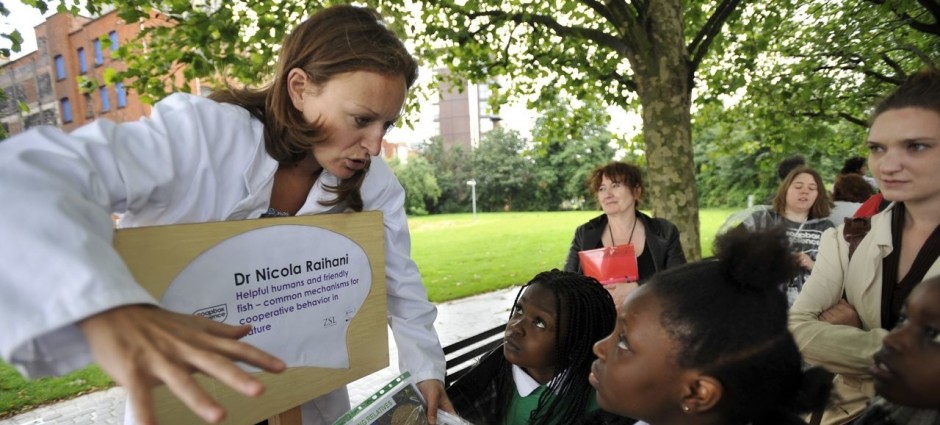 Tara is a Postdoctoral Research Associate at the University of Sussex, studying Astrochemistry. After an undergraduate degree in physics at the University of Oxford Tara did not want to do a PhD straight away and so went to work at the National Physical Laboratory (NPL) in the surface and nano-analysis group. There she worked on developing the metrology (measurement science) for new mass spectrometry techniques, undertaking a variety of research, from understanding the fundamentals of these new techniques to making them more reliable and repeatable, and also analysing different commercial samples. Whilst working at NPL she received a PhD in conjunction with the School of Pharmacy at the University of Nottingham. Tara’s current research uses laboratory experiments to understand how molecules would behave on dust grains in the extreme conditions of deep space.
Tara is a Postdoctoral Research Associate at the University of Sussex, studying Astrochemistry. After an undergraduate degree in physics at the University of Oxford Tara did not want to do a PhD straight away and so went to work at the National Physical Laboratory (NPL) in the surface and nano-analysis group. There she worked on developing the metrology (measurement science) for new mass spectrometry techniques, undertaking a variety of research, from understanding the fundamentals of these new techniques to making them more reliable and repeatable, and also analysing different commercial samples. Whilst working at NPL she received a PhD in conjunction with the School of Pharmacy at the University of Nottingham. Tara’s current research uses laboratory experiments to understand how molecules would behave on dust grains in the extreme conditions of deep space.
Tara will be speaking at Soapbox Science Brighton on 2nd June 11am-2pm with her talk “We are made of starstuff”.
SS: What attracted you to Soapbox Science in the first place – and what are you most looking forward to/excited about in taking part?
TS: I have participated in public engagement events before and always found it exciting to talk about my research to anyone and everyone! Soapbox science is a different format to anything else I’ve encountered and I’m looking forward to the challenge of communicating my research in a different way.
Everyone has heard about space, but very few people are aware of the chemistry happening there. I’m excited about telling people about this new and growing field.
SS: What, or who, inspired you to get a career in science?
TS: From a young age, I’ve been interested (and good) at science, particularly maths and physics. I knew early on that it was something I wanted to study in depth and things have just lead on from there.
SS: What is the most fascinating aspect of your research/work?
TS: Recreating deep space in the lab is pretty cool, literally!
SS: Research in STEM is increasingly multi-disciplinary. Which subjects do you use in your work?
TS: I did a physics degree and now I work in a chemistry group. I use understanding from both chemistry and physics in my research. I also have to understand the astronomical applications of my work. I think that at some level, things are not clearly defined as one particular subject!
SS: What 3 attributes do you consider important to your work (e.g. creativity, team-work, etc), and why did you pick these?
TS: Problem solving, practical adeptness and perseverance are all important in what I do. A lot of my work is in the lab and so I have to be happy to be hands-on with the kit including addressing problems when it doesn’t work and not giving up when things don’t go smoothly. Problem solving and perseverance also apply to data analysis when trying to interpret results and deciding what experiments to do next.
SS: If you could change one thing about the scientific culture right now, what would it be?
TS: Lots of things, but particularly short term contracts! Moving around for positions can be great, but this often occurs at a time in life when you would like to settle down a bit.
SS: What would be your top recommendation to a female student considering pursuing a career in academia?
TS: Try to get experience of as many different aspects of research as you can. It’s a good idea to go to conferences, firstly to practice presenting your research which really helps focus on what the important points are, and secondly to talk to other people about their experiences in the wider academic world.
SS: What words of encouragement would you give to children who might be interested in a career in science?
TS: Follow whatever your heart tells you to. If you are interested and passionate about science then your natural curiosity will take you a long way to succeeding.
